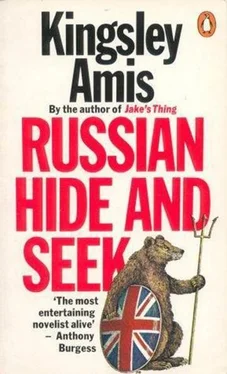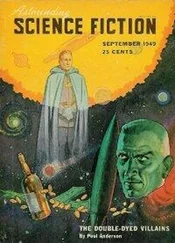‘Listen to this, you fellows,’ he said. ‘Apparently there was a big fire in Northampton last night. In the theatre there – they were putting on some old English play or other. Seems to have been quite a blaze.’
‘What of it?’ asked Vsevolod. He had a red face, bristly hair and pop eyes, all of which went almost too well with his manner.
‘Well, nothing very much if you insist. I just thought somebody might like to know that, against all expectation, something does sometimes happen in this depressingly unimportant part of the world. No more than that.’
‘And quite enough too, thank you.’ Victor had his elbow on the table and his forehead in his hand. His breakfast had consisted of three glasses of mineral water and a cigarette. ‘Not worth shouting your head off, anyway.’
‘Sorry. A girl was killed, it says here. English. She’d been acting in the play. Trapped and overcome by fumes. Isn’t that terrible?’
‘Nothing like as terrible as what you’re doing to the inside of my skull.’
‘Alexander missed a chance there.’ Vsevolod grinned as he spread cherry jam on white bread and butter. ‘If he’d been around he’d have charged in through the flames, snatched up the girl in his powerful grasp and ridden off with her over his saddle-bow.’
Alexander said with great earnestness, ‘Ballocks to you. Fuck your mother, you pig. In this outfit we serve for a while before we start trying to be funny. Have you got that?’
‘Yes, Petrovsky.’
‘See you remember it. – Well?’ he said to the mess corporal, who had just come in.
‘Your orderly is at the door, sir.’
Without another word Alexander threw down his napkin and strode out. There was a ripple of relief and amusement round the table.
‘Can’t he take a joke?’ asked Vsevolod.
‘Usually he can,’ said Dmitri. ‘Another time he’d have roared with laughter. It depends entirely on how he happens to be feeling. He’s probably worried about the court-martial. I don’t blame him. I certainly am.’
Victor scowled. ‘Why don’t they get on with the confounded thing? The prosecutor’s been here a week. What’s he doing?’
‘Getting drunk?’ suggested Vsevolod.
‘That depends how much sense he’s got,’ said Victor.
Dmitri gave an admiring chuckle and said, ‘You never miss a chance, do you?’
‘Horse-shit,’ said Victor. ‘I think I feel strong enough now to try some tea.’
There was no relief from the humidity outside. In the remotest distance, greyish clouds moved sluggishly. The orderly, a bony, bullet-headed youth with a twitching eyelid, drew himself up and saluted – smartly, many would have said, but not Alexander, not this morning.
‘As you were! Again! All right, I won’t waste my time. What is it?’
‘Sergeant Ulmanis’s compliments, your honour, and this has just come by the CO’s orderly.’
Alexander took the proffered envelope. It was grubby, but he noticed nothing; envelopes were always apt to be grubby. This one contained an informal, hand-written note from Colonel Tabidze inviting him to tea and after-lunch drinks at two o’clock that afternoon. If the party went on much above half an hour he would be late for Mrs Korotchenko. Well, that could be endured.
‘Is there an answer, your excellency?’
‘No, and get those trousers pressed before you go on parade or you’ll find yourself on a charge. Move!’
The inspection passed off without incident. Alexander lunched early at the squadron and rode out in good time for the Tabidzes’ house, where the colonel more and more preferred to spend those hours not absolutely required by duty. It was a handsome Victorian red-brick building with a turret at each corner and a porch largely constructed of wrought iron, and must have made an impressive sight in the days before the surrounding grove of Scotch firs was chopped down. From a staff on the roof of the porch the regimental standard hung limply in the motionless air. A servant took Polly’s reins and led her away; an other opened the front door as soon as he knocked, led him down a rather dark passage smelling strongly of furniture-polish and slightly of excrement and showed him into a room at the far end. This was the library, so called because part of one wall was given over entirely to bookshelves; elsewhere, sporting trophies, maps, photographs of rows of stern men in uniform and other objects of unimpeachable soldierliness were to be seen. Alexander had happy but sketchy childhood memories of it all.
‘Ah, my dear boy, how nice of you to come.’ Wearing a belted civilian jacket that showed off his slim figure, Tabidze hurried over to meet him and shook him warmly by the hand.
‘What appalling heat. I shouldn’t wonder if there’s a storm on the way. I must say I hope so. Let me make some fresh tea; this stuff’s only fit to be thrown on the rose-beds. Do help yourself to a drink. And try one of those oatcakes with it – it’s an old Northampton thing, I’m told. Well, how’s my worthy friend Major Yakir?’
Pouring out a small glass of Dufftown-Glenlivet while the other busied himself with a quick-kettle, Alexander answered the question and others that followed. He answered them carefully because, from being quite certain what was in store for him and quite unperturbed about it, he had moved to a state of painful anxiety. It was normal for his commanding officer not to be short of things to say, but his normal style was a slightly remorseless pursuit of one point at a time, not this directionless chatter – he had turned now to incoherent reminiscence. Just as uncharacteristically, he had not yet looked his visitor in the eye.
They soon made themselves comfortable (physically at least) in a pair of imitation-leather chairs, one each side of the empty fireplace. Within Alexander’s reach stood a small round-topped table loaded with tea, whisky, oatcakes, chocolates and cigarettes. Tabidze sipped a glass of white wine.
‘Have a chocolate, Alexander – they go well with the whisky too.’
‘No thank you, sir.’
‘Have a cigarette, then.’
‘That I will – thank you, sir.
‘Let’s get down to business at once,’ proceeded Tabidze, though his tone was less ready than his words. ‘I have things to do later today and I’m sure you have too. First of all, this is nothing to do with your court-martial, so we can have that out of the way to start with. But I will tell you that the proceedings are fixed for Tuesday and, in confidence, that the tribunal is disposed to take a lenient view, at least in your case as the most junior. You’re to be awarded a severe reprimand.’
Alexander said nothing, because he thought nothing, about the principle involved (or the one flouted) in determining the sentence before the start of the hearing. The gloom and uneasiness that had lain upon him ever since waking lifted slightly. The court-martial would never take place, but it was pleasant to be vindicated, even in so unimportant a way. He muttered something and looked suitably humble, grateful and so on. Then, looking anxious instead, he asked, merely because it sounded right,
‘What about the others, sir?’
‘Rather less leniency there. Nothing harsh, however.’
He had just started to look relieved when Tabidze thoroughly disconcerted him with the offensive query,
‘What really happened that night?’
(It was offensive because it took for granted that he had been lying before.) He was soon himself again, reflecting as before that none of this was going to matter in a couple of days. He said with the utmost seriousness,
‘I wasn’t there at all. I stayed away after the first time. Oh yes, it was a favourite diversion of Leo’s. He talked the others into it. He must have been mad.’
Читать дальше












